For years Gurkha soldiers fought wars for Britain, but despite promises of equal pensions and rights, their pleas are being delayed by the government due to which, campaigners are angry as they struggle to make ends meet.
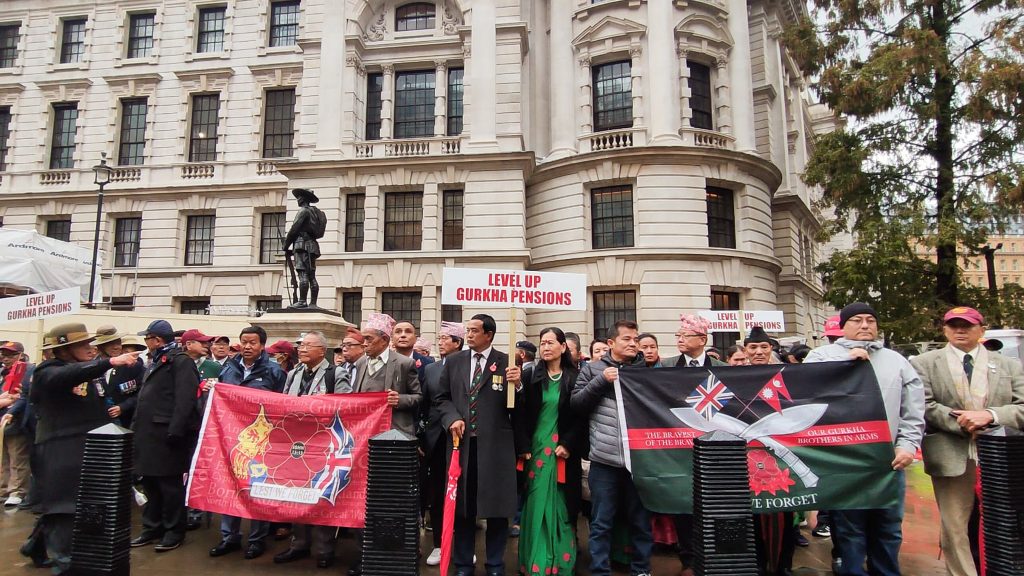
As the sun started setting, Shaindra Thapa got ready to go back home from her twelve-hour shift. She was by herself in a foreign land, scared to speak a different language that she was not fluent in. But, her life was not always like this. She had lived a different life full of pride and honor before coming to the UK.
Her late husband, Shankar Thapa was a British Gurkha soldier, meaning, he had one of the most honorable jobs a Nepali would get during the 90s. She recalls the time when the news of her husband’s demise was announced. All her dreams and promises were shattered and gone with her husband; the only thing left was her six-month-old son.
“My husband fought wars for this country, and he was proud to be a Gurkha soldier but what did this country do to him and us? I was entitled to get a full pension for my late husband, but I still remember the first time I went to take the pension money, they handed me £11 for three months which was too less for what I was supposed to get,” she said.
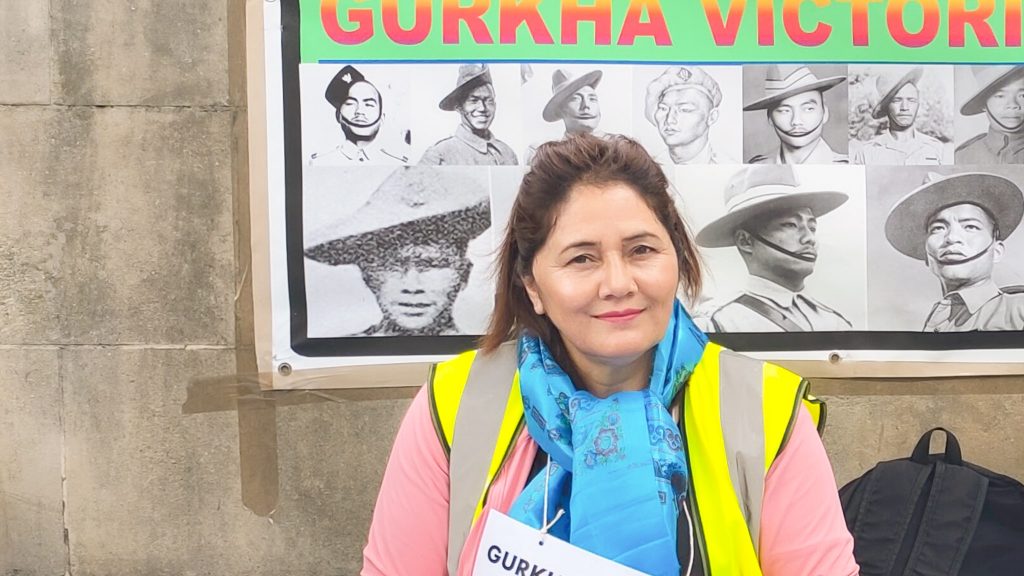
Shaindra says since the country has not been fair, she never wanted to come to the UK, but she did it because of her son and better opportunities.
“I came to the UK to provide better opportunities to my son but he could not complete his studies as we struggled to make ends meet. The only source of income was my late husband’s pension which was lesser than what was promised, so I started working”, she said.
In the year 1947, the three countries, India, Nepal, and Britain signed the Tripartite Agreement which concerned the rights of Gurkhas recruited in the military services of India and Britain. The agreement stated that these Gurkhas will receive equal welfare facilities and pensions as Indian and British citizens.
Although the Indian government has been giving pensions according to the Tripartite Agreement, campaigners claim that the British government has been unfair and is not issuing pensions as well as welfare benefits according to the Agreement, hence, their promises seem empty to Gurkha veterans.
Retired Major Judbahadur Gurung, a spokesperson of The Gurkha Satyagraha Committee said, “It all seems hollow. Every time they say they acknowledge our sacrifices and hard work but at the time of giving, they don’t do anything which makes all of their statements hollow.”
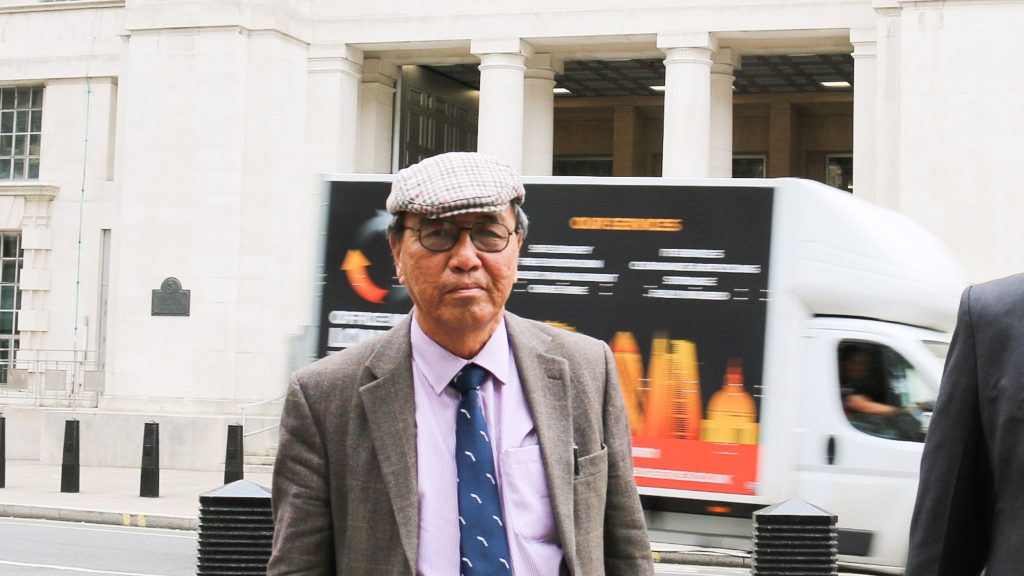
“On our first day as Gurkha soldiers, our British officers order us and make us say that we will be better than British soldiers and fight more than they ever will but let me ask you, we wear the same uniform as British soldiers, we eat the same ration, we go to the same battlefield then why do they expect us to be better than them? And even if they do, why are we not getting the same facilities as British soldiers then? he said.”
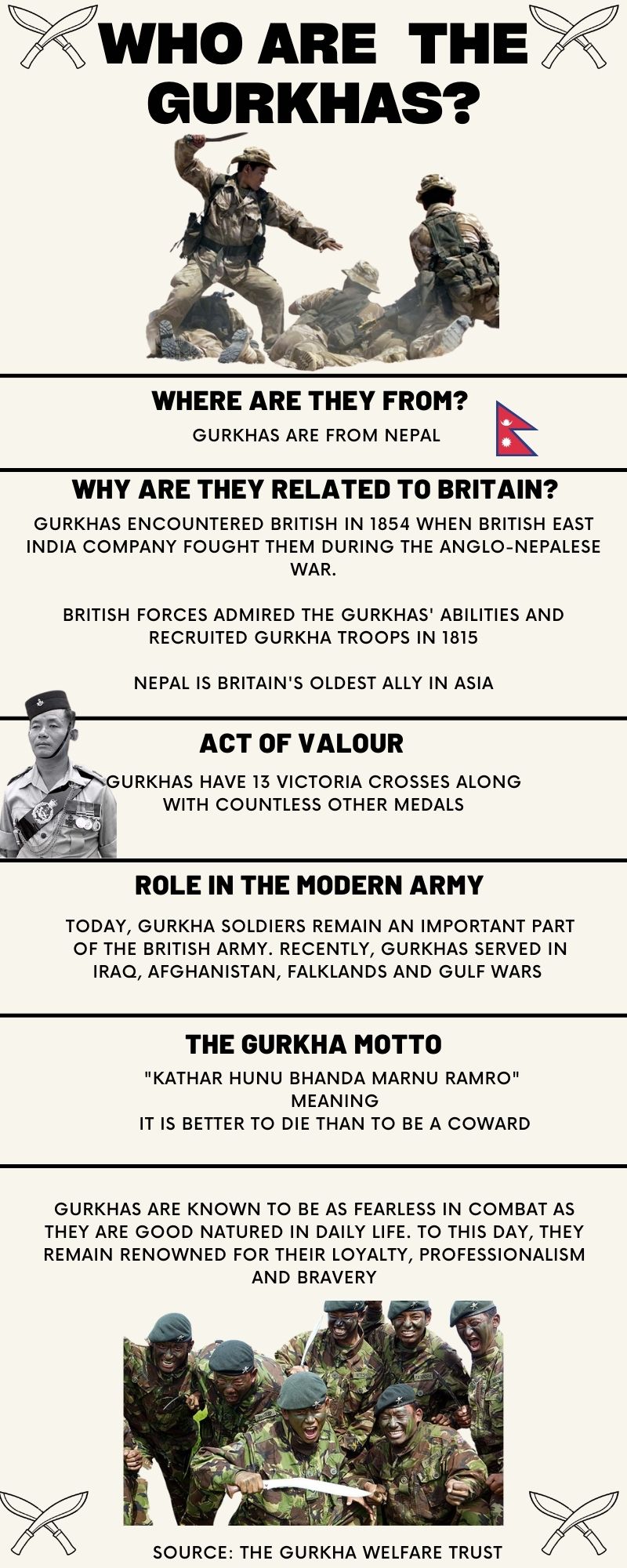
Gurkhas are Nepalese-born soldiers who were recruited by the British army in the year 1815 where they fought two world wars as well as served in countries like Hong Kong, Iraq, Afghanistan etc.
The Ministry of Defence said that the Gurkha Pension Scheme was based on the Indian Army Model and provided an immediate pension at Indian Army rates to those with at least 15 years of service, but Gurkha veterans accuse the British government of making them redundant and not giving them the compensation, which was due.
Major Gurung said, “Our soldiers were made redundant by the government. They were sent back home even when they did not want to, so they deserve to get the compensation for that.”
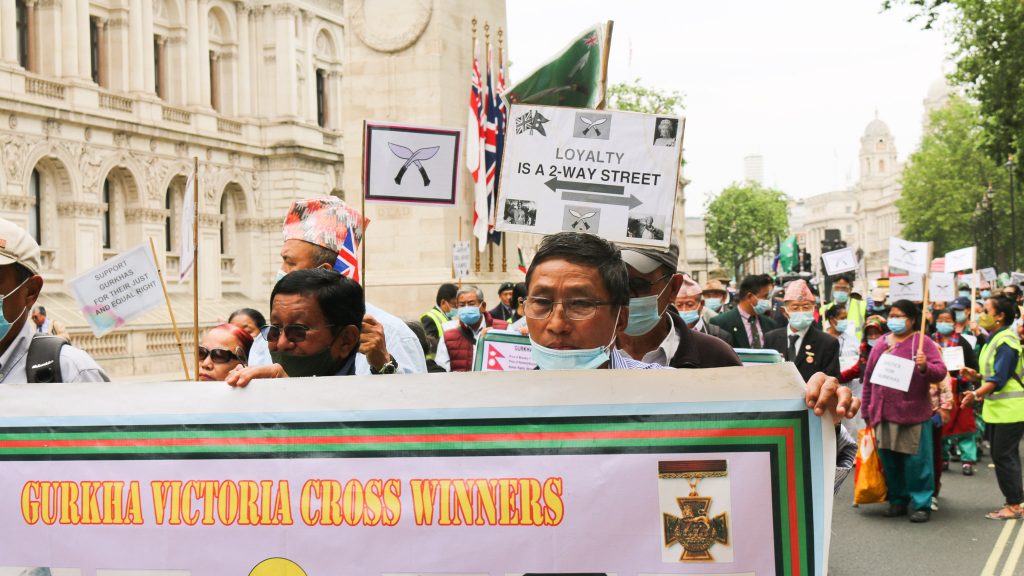
In 2009 with the help of British actress Joanna Lumley’s campaign, Gurkhas who retired before 1997 won the right to settle in the UK. But even so, the campaigners wanted more than just settlement rights. They demanded equal pensions and welfare benefits for Gurkha veterans who retired before 1997.
The UK Government however rejected the offer due to which in 2013 and 2021, ex Gurkhas staged hunger strikes that lasted for 15 and 13 days respectively, after which the British government agreed to talk to them. However, the campaigners are frustrated as the talks were either dismissed or delayed due to political changes in the UK government.
“They have been delaying the talks and it is an excuse. They are not taking us seriously and we are getting frustrated and if this continues, we must go back to hunger strikes. There is no other option,” said Major Gurung.
Gyanraj Rai, 64, from Reading, is among those who took part in the hunger strikes both times. He believes he was too naive to know that he and his colleagues were getting mistreated in the Army.
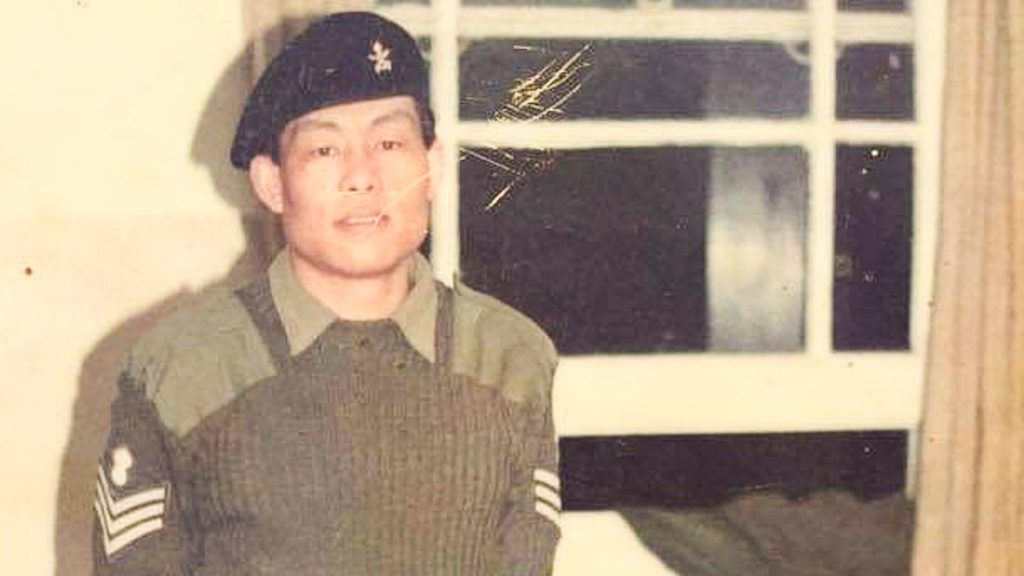
“When I spoke to others that’s when I realized that we Gurkhas were so naive. Always saying yes to everything that was thrown at us but now we question, why were we mistreated?” he said.
“I remember it was an Army pub and my colleagues from Britain and Hong Kong had gathered for a pint. There, the British guy said he will retire with £855 per month for his pension and £61,000 as lump sum money while the Chinese friend said he can’t get any pension but he will get £2,20,000 as a lump sum and he can reside in the UK if he wishes to but I was ashamed to even say anything as I was promised £47 per month for my pension, £4000 as the lump sum money and I had no rights to go to the UK. That was an eye-opening moment for me and I knew I had to speak up,” he said.
Gyanraj has been campaigning for Gurkha rights for the last 26 years. He says, even though he has met various members of parliament who promised that the government will give Gurkhas the justice they deserve, he is not optimistic about the next talk that IS set to be held on September 2023.
“These people give us false promises and if that doesn’t work, they say that Gurkhas are getting more pensions than Nepali ministers which is not true at all. We have been fooled many times but enough is enough”, he said.
In 2021, opposite Downing Street, Gurkha veterans raised placards and banners while chanting slogans like ‘Aayo Gorkhali’, meaning Gurkhas are coming. They were dressed up in formal attires with medals and khukuri badges from their time in the army stitched to their uniforms. Some people trembled as they were too old and had to take seats while those who could stand, stood there for 13 days until the government agreed to talk to them.
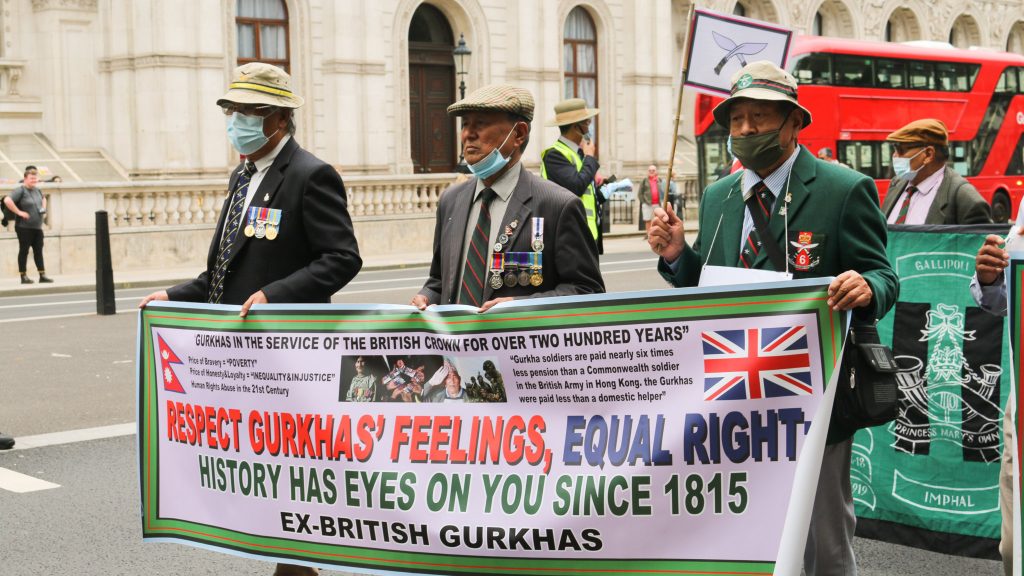
Premila Tamang, the founder of the campaign group, Gurkha Equal Rights first went to the 2021 protest site unaware of what it was all about. She says she became a different person after spending a day with these people who had stories to share but no one heard them.
“I spoke to these people and felt that I was so unaware of what had gone wrong in history, and it still has not been rectified by the British Government. I think the lack of information about Gurkhas has been a key role in this injustice. If people knew what Gurkhas have gone through, they would happily extend their support, but the tales of their sacrifices still have not been heard by people”, she said.
Premila believes that Gurkhas are more than capable of holding bigger rallies and protests, but they are not doing so just out of respect for the British government.
“These hunger strikes are not even protests, these are more like symbolic marches, and we can of course be like those just stop oil protestors, but we don’t want to be that extreme only out of respect,” she said.
On the other hand, Ministry of Defence issued a statement that read, “We greatly value the huge contribution Gurkhas make to the British Army and ensure they are supported with a generous pension and medical care during retirement in Nepal.”
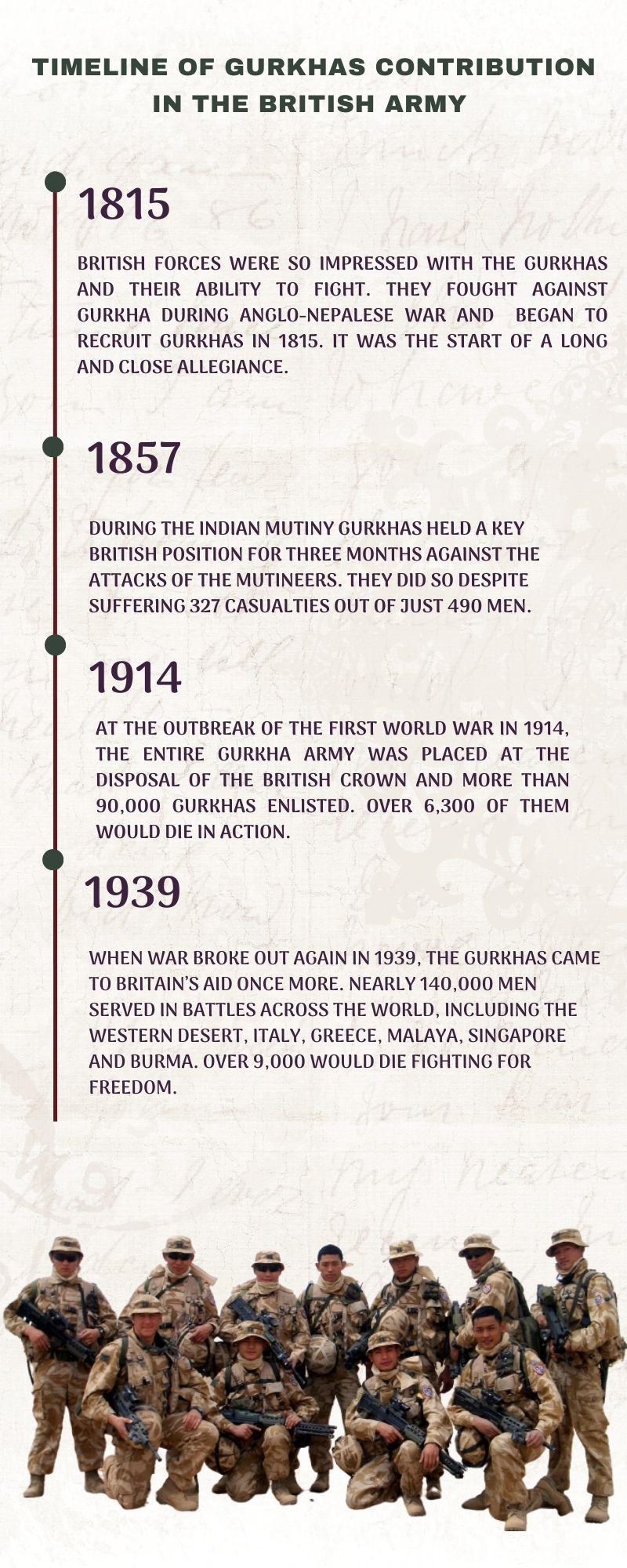
Gyanraj hopes that one day they will get the respect and justice they deserve, and Britain will acknowledge the sacrifices his countrymen did for this country but for now, he will fight as much as he can.
“This campaign took 26 years of my life and if there is a hope of things getting better, I am ready to sacrifice the rest of my life if I have to,” he said.
